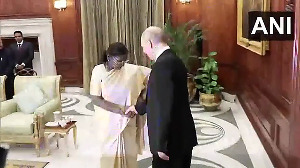The Afghan Taliban shared details of what they will be discussing with the US but did not divulge what had been previously discussed, said an Afghan leader privy to the developments. He claimed that a senior Qatari official was playing an important role in the talks.
Click here for Rediff Realtime News!
"The Taliban have asked Pakistan to point out if it has any objection to the issues they have prioritised for talks with the US," the Afghan leader said. The Afghan Taliban also informed the Haqqani network on the dialogue with the US and futures plan, he said.
Nasiruddin Haqqani, the elder brother of warlord Sirajuddin Haqqani, recently travelled to the United Arab Emirates and met the top Taliban negotiator, Tayyeb Agha, to discuss the Taliban-US interaction.
"Nasiruddin could not travel to Qatar for some reason and went to Dubai to meet with Agha," the Afghan leader said. Agha flew to Dubai to meet the Haqqani network leader. The Afghan leader, who requested not to be identified, met Nasiruddin on his return from Dubai. The Afghan leader did not confirm media reports about the release and subsequent repatriation of some Taliban prisoners from the US prison at Guantanamo Bay in Cuba. However, he said Taliban negotiators had asked for the release of several key prisoners from Guantanamo, Bagram, Pul-e-Charkhi and other prisons as they would be part of the "formal negotiations".
Former Taliban ambassador to Pakistan, Mullah Abdul Salam Zaeef, has voiced support for the US-Taliban talks but strongly opposed the involvement of "neighbouring countries" in the process.
"If Pakistan is involved in the talks, then Iran, India and other neighbours will also want to have a say in the process. Afghans cannot afford such rivalries. Afghans must make decisions independently and all countries should extend diplomatic support to the Afghan peace process," Zaeef said.
"Afghans are passing through a difficult phase and if other countries enter the dialogue process at this stage, then the process would not produce tangible results," Zaeef added. At the same time, he said, Afghans expect the peace process to move forward.
Qatar will soon send a delegation to Kabul to try and win over Afghan authorities, who have expressed strong reservations about the secret US-Taliban talks.
In December, the Afghan High Peace Council had announced it would send a delegation to Qatar but nothing has been heard from it since then.
President Hamid Karzai, in a recent speech to the Afghan Parliament, again expressed his government's desire that a Taliban office be opened either in Saudi Arabia or Turkey.
Taliban spokesman Zabihullah Mujahid, in an e-mail, confirmed that his group had formally opened a liaison office in the Qatari capital but did not share details.
Like Afghanistan, Pakistan is not happy with US efforts to bypass it in the Afghan peace process. "I believe Pakistan is aware of the developments in Qatar but has not been given a complete picture of the talks," an Afghan diplomat said.
After being ignored in the dialogue process in Qatar, top Pakistani and Afghan leaders recently agreed to revive their joint peace efforts, stalled after the assassination of top Afghan peace negotiator Burhanuddin Rabbani in September last year, the diplomat said.
Pakistan has proposed that President Karzai travel to Islamabad while the Afghan government wants President Asif Zardari or Prime Minister Yousuf Raza Gilani to visit Kabul, the diplomat said.
Islamabad and Kabul have argued that Doha is not a suitable place for a Taliban political office for several reasons. They argued that Qatar is a small country in the Islamic world and that many other Islamic countries, including Saudi Arabia, Turkey and Iran, are opposed to this venue.








